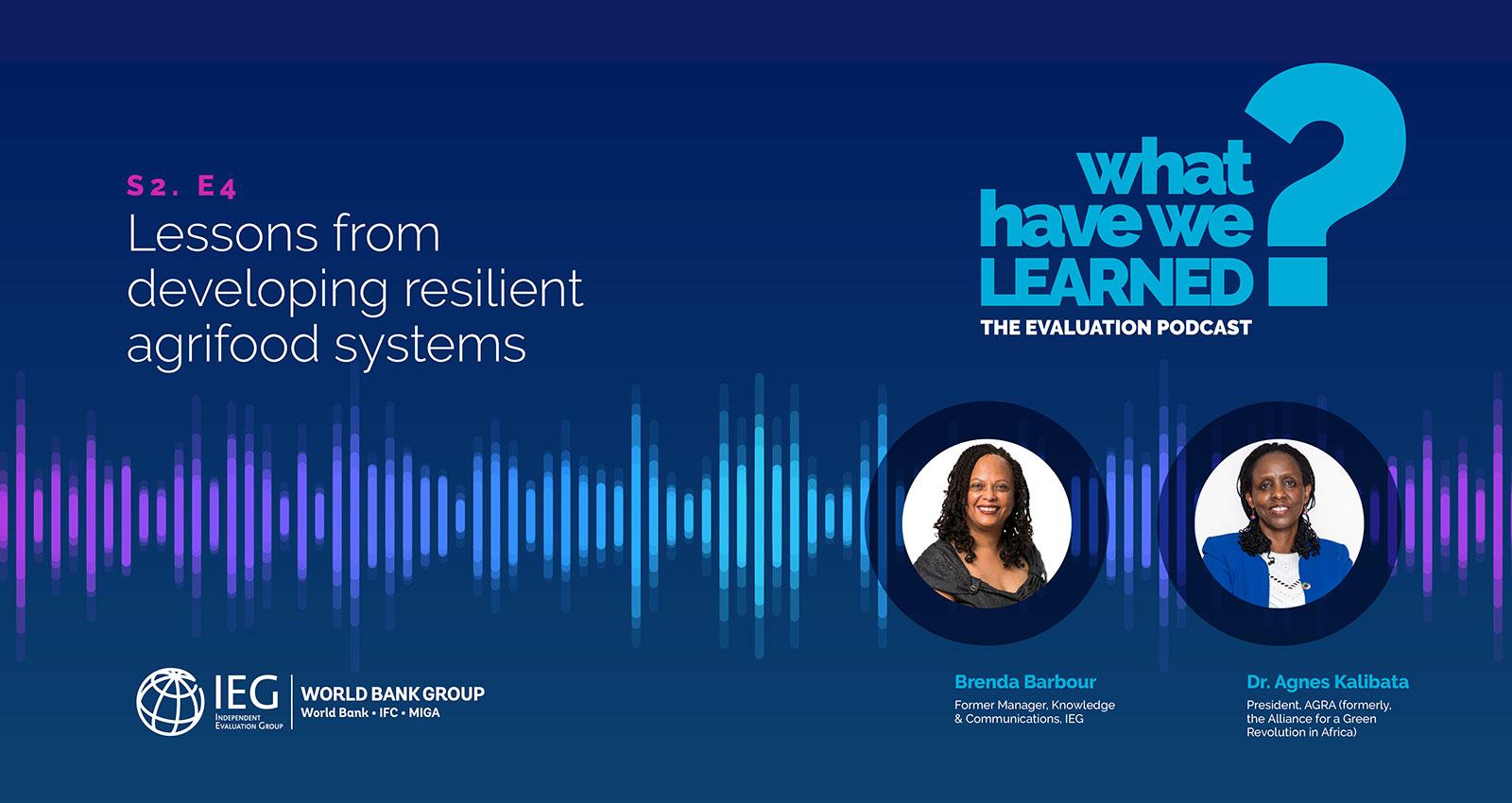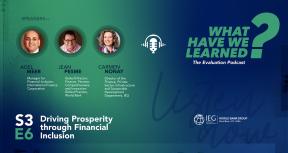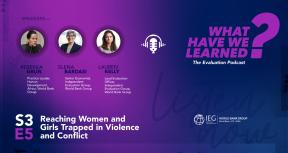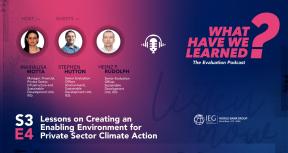345 million people in 82 countries were experiencing acute food insecurity by June 2022. Climate change, the Coronavirus pandemic and rising food prices due to the conflict in Ukraine threatened to drive this number even higher. One important path to promoting long term food security is building well-functioning agrifood systems. These systems are especially important now in the face of global shocks.
In this episode, Dr. Agnes Kalibata, president of AGRA, joins host Brenda Barbour to explore the importance of developing well-functioning and resilient agrifood systems, and how the World Bank Group and other actors can support countries in developing agrifood systems that are productive, resilient, and sustainable.
Listen on Spotify, or Apple Podcasts.
Related Resources
- IEG Evaluation:Toward Productive, Inclusive, and Sustainable Farms and Agribusiness Firms: An Evaluation of the World Bank Group’s Support for the Development of Agrifood Economies (2010–20)
- Blog: Building inclusive, productive, and sustainable agrifood systems
- Blog: Complementary Interventions for Agrifood System Development – Insights and Lessons
- Blog: Sustainable Diversification of Agrifood Economies – Insights and Lessons
TRANSCRIPT
Brenda:
345 million people in 82 countries were experiencing acute food insecurity by June 2022. Climate change, the Coronavirus pandemic and rising food prices due to the conflict in Ukraine threatened to drive this number even higher. One important path to promoting long term food security is building well-functioning agrifood systems. An Agrifood system includes everyone from farmers to distributors and consumers, the environment in which they operate and the rules and standards governing that environment. In low-income countries, in particular, well-functioning agrifood systems have a vital role to play in both promoting food security and reducing poverty. These systems are especially important now in the face of global shocks. So, how can the World Bank Group and other actors support countries in developing Agrifood systems that are productive, resilient, and sustainable? And what are the lessons for future efforts? Welcome to What Have We Learned? The Evaluation Podcast. I'm your host, Brenda Barbour, of the World Bank Group's independent evaluation arm, IEG.
I will be exploring the importance of developing well-functioning and resilient agrifood systems with my guest, Dr. Agnes Kalibata. Dr. Kalibata is the president of AGRA, formally known as the Alliance for a Green Revolution in Africa. She was the UN Secretary General's special envoy to the 2021 Food System Summit and the Minister of Agricultural and Animal Resources of Rwanda from 2008 to 2014. She has been heading AGRA since 2014 and has a distinguished track record as an agricultural scientist, policy maker, and thought leader. Welcome, Dr. Kalibata, to What Have We Learned? Let's begin with your experience as the Minister of Agriculture and Animal Resources of Rwanda. How did you approach the development of a Agrifood system in Rwanda and how did that work fit with the national development goals of the country?
Dr. Kalibata:
Thank you for having me. I'm really happy to be part of this conversation for a topic that I care about very much. And of course, to start with a question on Rwanda is something I'm particularly passionate about. When I joined the government in Rwanda, the country had an agenda. The 2020 vision, it had a vision and had a number of things it needed to achieve. Part of that was being able to feed itself with an increasing population that was projected to double by 2020 to increase its per capital income, which was one of the lowest at 290 US dollars then. And to increase its annual growth at 7%, if it was to be able to achieve the things it needed to achieve to feed itself - we really needed to grow at about 7%.
We needed to design programs that ensured that we leave nobody behind.
The agriculture sector was one of those that had millions of people living in agriculture, and we needed to design a program that ensured that small world farmers, that in the sector can be catered for. So, we designed what we call the Land Consolidation Program that recognizes that Rwanda has very small pieces of land and if you're going to do anything that is market oriented, you need to think about how to bring along everyone. We also worked with a principle of work with what works well for different regions. It's kind of regionalization by commodity where rather than force a commodity in a given environment, we actually went with what was naturally endowed in different regions of the country. And then we super imposed on that an intensification program that we recognized that we really needed to increase productivity at the bottom line.
For small pieces of land, farmers needed to increase productivity and have access to markets. So, all those were done really in service of one goal. The VISION 2020 ensure proper growth, ensure 7% growth and ensure that we can feed ourselves.
We were able to reduce poverty by 12% points. A World Bank study showed that 65% of that was related to growth in the agriculture sector of which 15% was outside the sector but related to the sector. So we ensure that farmers get the productivity they need but also have access to markets. I'm really happy that we were able to do that.
Brenda:
Congratulations. That's an amazing accomplishment. And I wonder now with the Coronavirus pandemic, have you kept up with the outcomes in Rwanda and was there any reversal to that progress?
Dr. Kalibata:
With the Corona pandemic, like any other country, Rwanda has had its challenges. I think the area that has suffered the most from the pandemic, nearly every part of society has suffered the most. But I specifically wanted to call out the SME sector, the business sector, where these businesses, because of the disruptions of value chains, a number of businesses had to stop. But then it implied that either they can't come back up, they are going to eat up their capital bases and not be able to survive the challenges of Covid. So that was really an area that was badly hit. Of course, communities were also badly hit as you would imagine. Beyond health, the communities were really badly affected in the sense that the agriculture sector is what we are using to reduce poverty for a country that is purely agricultural.
It's a source of income for a lot of people. And then from a national perspective, most of these countries are struggling with the aftermath with the fact that so much resources were diverted to dealing with the health challenges of Covid and building the infrastructure that goes with it. But then the Russia Ukraine conflict, that does bring all sorts of challenges. When countries are beginning to think that they could recover from that, it really gets worse with increasing food prices, increasing cost of living, increasing fertilizer prices. I would say that Rwanda hasn't been very different from what other countries are suffering.
Brenda:
Given all of these compounding crises that are increasing food insecurity, are there lessons from your experience with the VISION 2020 activities that can be applied to today's situation?
Dr. Kalibata:
There are a number of things from the work that we did in Rwanda that can be applied to a number of areas. there are also things that I'm seeing in the current work that I'm doing, but In Rwanda specifically, being able to focus on what we can do well where and being able to ensure that we are actually creating the right balance between the environment and people is really great and important. being able to conserve that part of the environment, how we can conserve it is important.
Brenda:
I understand your parents were small farmers in Rwanda and then in Uganda after your family got displaced during Rwanda's struggle for independence in the early 1960's, did that early experience have any impact on the career that you chose or how you go about your work?
Dr. Kalibata:
I learned that smallholder farmers don't need to be poor. That they are poor because they're isolated from anything in the world. They're isolated in a world where seed systems are working, in a world where farmers have choices, in a world where fertilizers exist, in a world where markets exist, but they don't know because they're that isolated. And this is not just for refugees like my parents were, these are for rural communities in Uganda as well.
I didn't see that rural committees in Uganda had any better opportunity than I did, or my parents did. So, the sad part is, that the rest of the world was already living in plenty based on agriculture. And so, what I learned when I went to school and realized that we need to get access and to improve access to these villages - for me, the biggest discovery of all times, as far as I'm concerned as a village girl, is that someone figured out that we can use a motorbike, a bicycle and take seeds and fertilizers to villages because these villagers have sugar and Pepsi-Cola and Coca-Cola. How does Coca-Cola get to a village and seeds don't get there?
Brenda:
Right.
Dr. Kalibata:
For me, being able to set up those village shops that encourage, that allow farmers to have access to the inputs the rest of the world has access to, has been transformational. And I used that in Rwanda. I used it in the sense that it didn't matter how far the village was, farmers had access to these things. But the next thing then, the next day the president was there, they are saying, "We want a road." So, the production and production surplus becomes the reason for farmers to demand a road. That's why I call it the biggest innovation in rural farming - that bicycle that is taking seeds and fertilizers to farmers, was very important.
But then, linking that to my own life then, when I was Minister of Agriculture, I took a good variety of seed to my mom - she owns two acres somewhere in Rwanda - and I said, "Listen, this is your chance to really get the most from the agriculture sector." And she did, and she got five metric tons where she usually would get one ton. And she told me one thing. She said, "If you can't give me a market in time, if you can't tell me how to process these things in good time, if you can't show me how to store them, don't bring this seed back to me."
Brenda:
Right. Okay, fix those market failures, right? So IEG released a report last month on the World Bank group's support to countries on developing Agrifood economies. The report found that small holders and small producers, especially in low income countries, often struggle with low productivity and inadequate access to markets, suppliers, distributors, and other actors in the value chain. What are your insights on supporting small holders and producers in ways that ensure that Agrifood systems are not only resilient but also inclusive?
Dr. Kalibata:
Farmers are farmers. At the end of the day, they expect to get good seeds, they expect to get fertilizers, they expect to get markets, they expect markets to work for them. So, the ability of being able to pull these things together, ensuring that they have the service ecosystem for farming working for them is extremely important.
Dr. Kalibata:
When I was reading this World Bank report, it just occurred to me that we just can't manage agriculture in phases. You can't say, "Oh today you have seeds and fertilizers so you get a good year." No, the farmer gets stuck. We need to look at the whole ecosystem as a whole. We need to look at production happens in a market environment, in a financial environment where SME's have the ability to make markets work. That's the only way we can move forward. But we keep funding things in phases. As governments, we keep coming at this in phases or in programs that don't integrate and everything gets left on the table. Those farmers will not adopt. They know the value of these commodities but they want to do it.
Brenda:
Those policy makers should talk to your mom. She has the insight but it's also with the IEG report was really emphasizing is the need to connect them to all parts of the system, right? So that's great.
Dr. Kalibata:
here in AGRA, we have created an ecosystem that allows us to partner with businesses, give them an opportunity to provide the services they are able to and are set up to provide. And we focus on the weak links of why that system wouldn't function. We focus on the extension part, we focus on local distribution networks and supporting small businesses to survive in those environments, and then encourage private sector to support their businesses and has worked very well for us.
In some cases, we see very good adoption levels, especially if the market is working and where we don't see good adoption levels of improved technologies, it's because the markets are not working and there's nothing that will work. We make a farmer adopt whatever technology if the market is not working for them.
From what we've seen that farmers are able to engage… If you do the right things.
From an inclusion perspective, what I wanted to add is two things. The part of including youth in many of these programs we talk about and including women. if we want to talk about a 40% productivity gap when it comes to women. this comes from the fact that women don't access extension and necessarily as well as men do.
They don't go to the meetings where extension programs are discussed or some of these things are happening. some of the crops that women work with are not receiving the type of support that is needed from a research perspective, from a business development perspective. And so they end up being the crops that are left on the fields or in homes once they’re in surplus So ensuring that for gender, we do provide the same services and focus on ensuring that we provide the level of inclusion is extremely important at the firm level, but also from a business perspective.
At AGRA we have created a platform, we call VALUE4HER, just to ensure that women businesses in Africa, in the agriculture sector have the opportunity to gain knowledge, have the opportunity to have access to financial inclusion, have the opportunity to understand the challenges and the opportunities for financial inclusion and the expectations.
Dr. Kalibata:
The platform ensures that they have a meeting place. We have over 3,500 women businesses that are sent up to this platform. Some of them are doing pretty well, some of them are not doing as well. They share knowledge about markets, they share knowledge about how to access financing. They share knowledge of all sorts of things. And even as women share knowledge on how to manage a business as a woman.
We provide support. We provide support in the sense that we do have a deal room where we allow women to put forward their businesses, to come and defend their businesses to investors. So, we expose them to investors and investment opportunities. We profile them, we award the best. We keep ensuring that there's attention to what they're doing. And then we try to understand the things that limit financial access for this platform of women and then try to work with them. We do fund rating of businesses so that they can actually participate because they have been rated and are considered to meet standards for investments. those are the type of things we do in addition to ensuring that it's a learning platform where they have an opportunity to learn from each other but also to learn about the latest knowledge out there. It's a digital platform so it's easy to access from anywhere, I don't have to travel from where you are to be able to be part of this platform.
Dr. Kalibata:
I was going to talk about youth mostly because I'm particularly passionate about this topic. Africa's landscape is full of farmers, but every time people talk about farmers. They say, "Oh, Africa's farmers are 60 years old." Honestly, you've seen a 60 year old person in Africa. Are they farming? Africa's farmers, 45% of them are young, they're below 35. But just because they look old does not mean that they're old. 45% of the people that are farming in Africa are below 35. People are farming 18 to 29 is a huge percent, about 30% are farming. So I really think that there's an opportunity to work to increase productivity, especially labor productivity for this group of people. So that farming is a viable business for them because they’re in it as a business, but also it's an opportunity for them to strengthen the ability to feed their families. Something that is increasingly becoming... Especially from a nutrition perspective, something that is increasingly becoming elusive.
Brenda:
You said 45% of farmers in Africa are under 35, is that correct?
Dr. Kalibata:
Yes, it's true.
Brenda:
I didn't know that.
Dr. Kalibata:
That's why I said just because they look old does not mean that they're old.
Brenda:
What are the unique needs of these very young farmers?
Dr. Kalibata:
That's a really important question. These farmers need the agriculture sector to be productive. They are not in it to feed their families. They need to make money. They want to be able to have better productivity on their labor. That means they need improved seed, very good seed. And we know that with good seed you can, in the same place that you're getting one ton, you could get five metric tons and they need to be able to use fertilizers of course, but they also need mechanization. They also want to link into technology. They now know that you can have an Uber tractor, you can Uber a truck on your phone and be able to access it. They know you can find a market on your phone and be able to access it.
Brenda:
And how is AGRA specifically supporting them?
Dr. Kalibata:
this is a program that we are taking on more recently in our new strategy, because we see the opportunity again to engage them better. We are using them now as extensionist where we see that extension has completely failed in most of these places. We are using young people to take on extension, basically self-employed as a self-employed opportunity. We are using them to take on village shops for inputs, but more importantly we see them as an opportunity to be able to ensure that nutrient rich varieties that are new, high yielding varieties that are there, that these things become viable in villages.
I guess the most important part of young people, is creating a business ecosystem in villages because they understand how to create this business ecosystem. And you will notice in Africa actually, people that are connected to the ecosystem, that young people were actually busy finding how to create businesses using the digital environment.
Those businesses thrived and went up faster. We have, since we’ve seen Uber motorcycles taking vegetables around, we have since seen Uber input distributors. So, these are things that are beginning to work and work very well for young people.
Creating an integrated marketplace that services farmers, that is part of actually what your report talks about is extremely important. These young people do understand and would love to be part of that ecosystem. So, we are beginning to see that, that's an area we can enhance, but more importantly we need a policy ecosystem that works for young people. We need to be able to provide space for them in all these businesses. We need to provide space for them so that they're not struggling to survive, that they can actually thrive.
Brenda:
Well let's talk about the lessons for international organizations such as the World Bank and UN agencies in supporting countries to build inclusive, resilient and productive food systems. What is needed to get us back on track to achieve the SDG's?
Dr. Kalibata:
For all of us, World Bank, UN, the biggest lesson of what has been going on in the agriculture sector, the need to build resilience and inclusivity, productivity, all these things are happening because of the challenges we are having in our environment. And the biggest lesson for me is the current reversal of lessons and work and things we have achieved over many years. this is happening in many levels. It's happening at national level, where governments were beginning to build themselves, from low income to middle income. All this is being eaten away and reversed in our very eyes. businesses are struggling to stay on top of the environment we're working with, households now have to pay 40 to 60% to be able to have the things they had last year, just to be able to be exactly in the same spot as well last year paying 40 to 60% more.
All the things require that we think differently. for me, looking at the World Bank as the institution that supports most of these countries, we can't be in that type of environment where there are all these reversals where all these challenges and do business as usual. We cannot support the same type of loans. We need to think about what do we need to build in our instruments and the instruments we design for countries to be able to help them deal with the challenges they're dealing with. What are you thinking about for redesign of your programs that will support countries deal with this challenges? We can't have the same conditionalities of loans. What do your loans require? And what are going to do differently? What are your programs require and what are you going to do differently?
The ground below our feet is shifting very fast because of climate change, because of conflict and because of our failing food systems. World Bank, the United Nations, what vision do they have for the future where we are going, they must stay one step ahead of this problem, otherwise everybody's struggling. We can't come at this reacting every time something happens. We need to be projecting the future based on the challenges we have. And do you guys have huge projection capacity? So it would be good to see how you project and are able to tell us how we stay ahead of these problems.
Brenda:
I'm so glad we are having you have this conversation. Let's turn to the future. How do you think Agrifood systems will evolve or need to evolve and what are the new opportunities and challenges that the future will bring?
Dr. Kalibata:
The most important part of where we are going is Agrifood systems need to evolve. We do know that we are impacting the environment. We do know that we are impacting people's health through the type of nutrition that is put through the food system. So we must evolve, we must focus on sustainability from an environmental perspective. What does again doing agriculture look like, to ensure that there's a future system of agriculture for our children and their children. And then we must ask ourselves about the cost to health. In the agricultural sector in trying to achieve food, there are two things that we don't factor enough. We don't factor in the cost to the environment.
There are opportunities to ensure that doing agriculture is not necessarily damaging the environment. we can build environmental sustainability into the work that we do so that is going to have to be one of them.
And then, the nutrition part, we lose a lot by delegating nutrition to the health sector. Nutrition comes in as a public challenge as opposed to a public opportunity. In the Food Systems Summit, we talked about the true cost of food. The true cost of food came in as the cost to the environment and the cost to health. These are real costs. These are real dollar figures that we actually account for in the wrong sectors.
We don't bring them to the agriculture sector as dollar figures, we should be accounting for as negatives in the agriculture sector because we pay for them elsewhere. So, we could avoid those by ensuring that we are diverse in the agriculture sector. We are producing what goes well, where. We are producing what works with the environment and we are producing with what works with our health.
These are all opportunities that we highlighted during the Food Systems Summit. And these are things that we can expound on. Just to give an example, in Africa we keep talking about importing all sorts of food, but honestly, we produce a lot of cassava and yam, and we have an opportunity to produce millet in the dry areas, which we don't do because we have not invested in improving these value chains. We treat them as local and that's zero value.
No, we need to ensure that we are providing the same level of research capacity, business research capacity, trying to understand these commodities and what they bring for us.
Dr. Kalibata:
And I see that there's some things that we need to think through even as we try to improve the food system, we must ensure that designing the food system recognizes the local context of each country, At the end of the day, it needs to come back to country level. What is each country capable of advancing and how can we as different coalitions that are happening in different spaces, be able to support countries where they're at? What are their needs, what are they moving forward? What are they doing well that we can support them with?
So, one of the biggest dangers is to look at this as a global program and not bring it to the ground and show that it serves people where they're at.
And then the last point I wanted to make is to ensure that as we build our food systems, we ensure that we are coordinating, we are not pitting one sector against the other. So, the environment and agriculture sector are always fighting.
… just ensuring that advancing food systems is not advancing challenges between these two sectors, that this is actually an opportunity for them to coordinate and come together better, I think would be good.
Dr. Kalibata:
The food system, it's a global challenge and it's failing across the world. But when I see how we engage in the Food Systems Summit, and when I see the follow up thereafter, there's a whole lot of interest from the global south, mostly because these countries are facing real challenges. I mean, to give you an example, here in East Africa, we basically have a failed season this season and is one of many. So these countries stepped for the African continent, stepped forward with a common continental position. 49 out of 55 countries were engaged. I don't get the same feel from the global north. We did get good funding from the global north, but this was not about funding. This was about commitment to failing food system. we want to see the same commitment from the north as is from the south because food systems are contributing 30% to emissions and when they don't work, the environment that we are working in, won't work.
Brenda:
Many thanks for joining me, Dr. Kalibata. It has been a fascinating conversation. To learn more about IEG's work on evaluating World Bank Group support on food systems and nutrition, please visit ieg.worldbankg.org. Don't forget to subscribe for future podcasts. This has been What have we learned? The Evaluation podcast. Thank you for listening.
This Episode’s Featured Guests:


Dr. Agnes Kalibata is President of AGRA. AGRA is an African led and Africa based institution that puts smallholder farmers at the center of the continent’s growing economy. Together with partners, AGRA is working to sustainably grow Africa’s food systems.
Dr. Kalibata served as the Special Envoy of the UN Secretary-General for the 2021 Food Systems Summit. At the UN Food Systems Summit, 166 countries committed to food systems transformation to accelerate progress towards the SDGs.
She was Rwanda’s Minister of Agriculture and Animal Resources (MINAGRI) from 2008 to 2014. During her tenure, Rwanda became a food secure nation.
Dr. Kalibata has a distinguished record of accomplishments as an agricultural scientist, policy maker and thought leader. She is the recipient of many prestigious awards. Dr. Kalibata sits on various panels, boards, councils and commissions to provide thought leadership around supporting sustainable, resilient and inclusive food systems.
For more information please visit: www.agra.org






